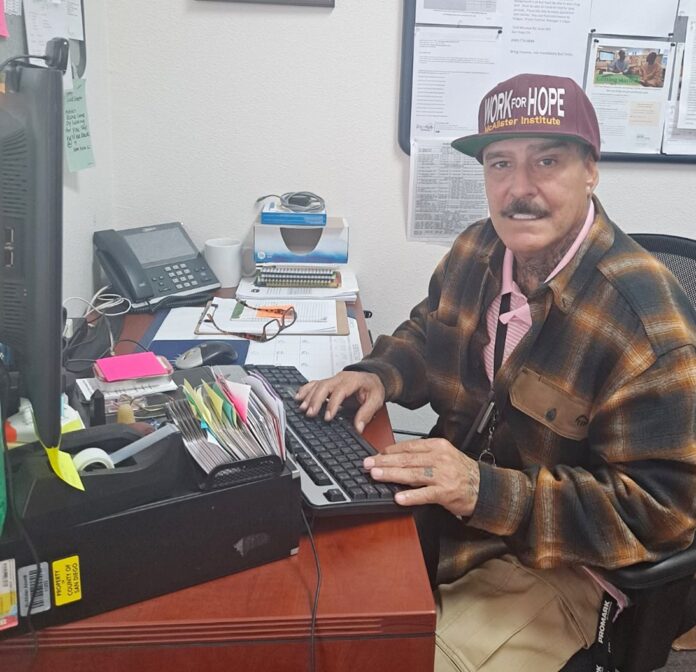It is a story of two cities. It is a story of two people. And it is a story of second chances. Both fought addiction and found a path out, and now they spend their lives changing the lives of people fighting addiction when they think there is no way out.
Jeanne McAlister, founder and CEO of McAlister Institute, headquartered in El Cajon, has built a formidable force of addiction rehabilitation throughout the county, changing one life at a time. Having celebrated her 90th birthday in July, and 66 years of sobriety in November, McAlister can still be seen in her office in El Cajon, answering phones, talking to clients, raising money and raising awareness that addiction can be overcome, and the people that lived through it can become productive citizens in their own communities. One of these people, is Joey Rubio.
Supervisor for the Work for Hope program which falls under McAlister Institute in partnership with the city of Chula Vista, Rubio works to get participants off the streets, paid jobs while taking vocational rehabilitation training, skill instructions, assistance with transportation, job readiness, and housing. But Rubio has come a very long way to get where he is today.
Rubio has spent more than 35 years in and out of prison. But now, after seven years he has not gone back to prison or picked up any drugs.
“McAlister Institute is the best thing that ever happened to me. Not only me but to thousands,” he said. “I love McAlister, and Jeanne McAlister. They took a chance with me when no one else would give me a chance. Nobody. She believed in me when nobody else would believe in me. I am grateful to her forever. And I am not the only one. When people see my McAlister, Work for Hope shirt, they stop me and tell me to tell Jeanne that they would not have the life they have today if it was not for her. She is adored. She never stops, and talk about empathy, she lives it.”
Jeanne McAlister said McAlister’s philosophy is to give everyone a second chance.
“I was given a second chance to regain and live my life, and I had no doubt in my mind that Joey deserved that, too. Joey is absolutely amazing and has a true heart to say the very least. He is one of the most enthusiastic people I know, and not only has he changed his life, but he is changing the lives of others around him,” she said.
Rubio said he has come a long way from his “very ugly childhood” to his role in the community today.
“Those who are supposed to love you or nurture you, they were not there like they should have been,” he said. “I am the product of an Italian and Puerto Rican culture. I come from a large family, and I believe it had some affect on my life. I grew up in a rough section of New York in the Marcy Projects and I always felt I was dealt a bad hand. I started rebelling very young. I started going to juvenile hall at an early age. I got into some serious drugs and by the time I was 13 I was already strung out on heroin, but I would do anything. When I was 15, after going in and out of juvenile hall, I lied about my age because I always wanted some kind of acceptance because I could not get that at home. Mom did not have time for us, none of us because there were so many of us. So, I went to prison because in New York you are tried as an adult at 16. I was in there nine months before they found out I was a juvenile. That life continued, and my addiction spiraled.”
Rubio said someone took notice of him which led him to being a juvenile trafficking drugs from state to state.
“I got deeper into drugs and kept going to prison,” he said. “Then I came to California thinking I was sick, slick and cool, because in New York we think we are three steps ahead of California. My life just spiraled, I was introduced to black tar heroin, and it just took off. It was already bad, but it just got worse. I got into gangs, started doing many prison times, and not counting juvenile hall, I have spent more than 35 years in prison. I just did not think there was a way out. I thought I was going to die in prison. That is all I knew. Prisons and the streets. In the streets I was staying in the canyons and anywhere I could. I could not find my way out of a paper bag. I continued to live like that for many years. I did my last term in prison in 2006 and came out in 2016, and I never looked back. I believe God had a plan for me. It took going through what I did to get to where I am today, serving the clients that I do today.”
Rubio said keeping a job was a problem, but it was because he used prison as a crutch because he really did not want to work.
“I wanted to do drugs and live the lifestyle that I lived,” he said. “I was comfortable with that. It took somebody from the head of probation who was very instrumental for me. She knew I had a drug problem. When I got out in 2016, I went to The Lighthouse Community. She told me she knew I had a drug problem, drug convictions, gang banging, guns, but she was not concerned with the drug addiction. Her concern was that I spent over 35 years in prison. She asked me when I was going to become the man that God intended me to be. When are you going to become a father to your seven children? When are you going to be a brother, a son to your mother? The waterworks came down and I could not stop crying. I was in that program for 36 days and they kicked me out. I was mandated to be there for a year, and they said I was too institutionalized.”
Rubio said he was then sent to Amigos Sobrios and met a man with his own background of gangs, drugs, and addiction.
“He saw something in me that I could not see in myself,” he said. “Just like Jeanne McAlister has, and many people in my life. It was a four-month program, but he kept keeping me there saying I was not ready to go. When I became 16 months clean, he told me it was time to put my big boy pants on because there was a whole world out there. I graduated the program and went to live with my future wife. I kept going to meetings and I could not get a job. For the first time in my life, I wanted a job so bad.”
Rubio said he was going to Narcotic Anonymous meetings, sometimes four times a day when he met two people from McAlister Institute and told him he should get an interview with McAlister.
“I did not even know how to do a resume,” he said. “They helped me out, I took it in, and they called me the next day. They asked if I was good with people, and they gave me a job. Jeanne McAlister gave me a scholarship and I was able to go back to school. My life has been 360 degrees. Today, I work with the Chula Vista Police Department, which might not impress you, but it astonishes the hell out of me. I did not like those guys. I did not trust those guys. There is good and bad in the police department. But I go to church every Sunday and there is good and bad in there. That is the world.”
Rubio said he tries to help people to get where he is today, but they must want to change. He said through Work for Hope, he works with the Chula Vista Police Department, City Hall, public relations, and the Homeless Outreach Team.
“I try to bridge the gap between the police and people on the streets, homeless, gangs, drug addicts, people like myself. God gifted me,” he said. “Coming from the same place as these people, I can show them how to become a productive person in society, how to get into the workforce, and life skills. I try to teach them that they do not have to take my path to get there. I have already done this for you. When they are done with me, they are back in the workforce. Some are reunified with their families. Many are just down on their luck, no addictions, but we find a way to get them back on their feet.”
Rubio goes to court for clients on behalf of McAlister and said he has been successful in reducing charges and sentences.
“The McAlister name carries a lot of weight, so I can tell a judge I come from the same environment, and if I could change, so can they. I was not given a second chance,” he said. “I was given thousands of chances. You are not supposed to just throw people away. It takes as many chances as it can to get somebody where I am today. I am blessed to work for McAlister. I love what I do.”
Rubio said he trains police recruits on how to approach people like himself.
“I am covered with tattoos from my neck down, but just because I have all this ink, I am not a bad guy. You have to have a lot of empathy to do what I do. So do the police. You must learn how to talk to people today. It is not what you say. It is how you say it. I would not stop what I do today because I love seeing the changes in women and men’s lives where they came from where I came from, and how they change their lives,” he said.
“With Community for Hope, we are constantly out there beautifying the city of Chula Vista, speaking engagements, landscaping, planting trees, and I am doing the most I can to make this program successful. There is so much we do for Chula Vista. It has been an awesome ride. There are hundreds we have helped since the program started four years ago. This program is working in Chula Vista. Chula Vista needs a detox center. McAlister is the only detox center in the county that is not faith based and you can take no medications. They feel like God will take it all away and that is nonsense. We need to find more resources. But you have to dangle a carrot to homeless people on addiction, which is about 80% of the homeless population. You want this, we have housing. But you must go to treatment, get clean, start working, become productive.”
Rubio said Jeanne McAlister came up with the name Work for Hope and built it from grants.
“The Lucky Duck Foundation has been instrumental in getting this program started. I wish more people would get involved and help. There is so much potential for this program. This program should go county wide,” he said.














